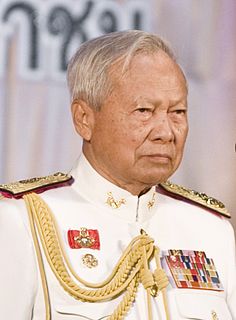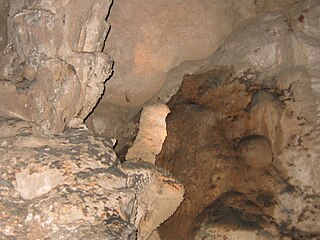Related Research Articles

The Tai ethnic group migrated into mainland Southeast Asia over a period of centuries. The word Siam may have originated from Pali or Sanskrit श्याम or Mon ရာမည, probably the same root as Shan and Ahom. Chinese: 暹羅; pinyin: Xiānluó was the name for Ayutthaya Kingdom merged from Suphannaphum city state centered in modern-day Suphan Buri and Lavo city state centered in modern-day Lop Buri. To the Thai, the name has mostly been Mueang Thai.

Until 22 May 2014, the politics of Thailand were conducted within the framework of a constitutional monarchy, whereby the prime minister is the head of government and a hereditary monarch is head of state. The judiciary is independent of the executive and the legislative branches.

Field Marshal Sarit Thanarat was a Thai general who staged a coup in 1957, replacing Plaek Phibunsongkhram as Thailand's prime minister until Sarit died in 1963. He was born in Bangkok, but grew up in his mother's home town in Isan-speaking northeastern Thailand and considered himself from Isan. His father, Major Luang Ruangdetanan, was a career army officer best known for his translations into Thai of Cambodian literature. He had partial Chinese ancestry.

Field Marshal Plaek Phibunsongkhram, locally known as Marshal P., contemporarily known as Phibun (Pibul) in the West, was a Thai military officer and politician who served as the Prime Minister of Thailand from 1938 to 1944 and 1948 to 1957.

Kriangsak Chamanan served as prime minister of Thailand from 1977 to 1980. After staging a successful coup, he was asked to become Prime Minister in 1977, he ruled till 1980 and is credited with "steering Thailand to democracy" in a time where internally, communist insurgents are rampant and neighbouring countries have turned to communist rule following the communist takeover of Vietnam: South Vietnam, Laos, and Cambodia. He died on 23 December 2003, aged 86.

The history of Thailand from 1973 to 2001 saw an unstable period of democracy, with military rule being reimposed after a bloody coup in 1976.

The history of Thailand from 1932 to 1973 was dominated by military dictatorships which were in power for much of the period. The main personalities of the period were the dictator Luang Phibunsongkhram, who allied the country with Japan during the Second World War, and the civilian politician Pridi Phanomyong, who founded Thammasat University and was briefly prime minister after the war.

The Communist Party of Thailand was a communist party in Thailand active from 1942 until the 1990s.

Prem Tinsulanonda was a Thai military officer, politician, and statesman who served as the Prime Minister of Thailand from 3 March 1980 to 4 August 1988, during which time he was credited with ending a communist insurgency and presiding over accelerating economic growth. As president of the Privy Council, he served as Regent of Thailand from the death of King Bhumibol Adulyadej on 13 October 2016, until the 1 December 2016 proclamation of Vajiralongkorn as King. At the age of 98, Prem was the longest-living Thai Prime Minister.

Chatichai Choonhavan was a Thai army officer, diplomat and politician. From 1986 to 1991, he was the chairman of the Thai Nation Party and served as the Prime Minister of Thailand from August 1988 until the coup d'état of February 1991.

Chavalit Yongchaiyudh, also known as "Big Jiew", is a Thai politician and retired army officer. From 1986 to 1990 he was the Commander-in-chief of the Royal Thai Army (RTA), and Supreme Commander of the Royal Thai Armed Forces from 1987 to 1990. In 1990 he founded the New Aspiration Party which he led until 2002. He was Thailand's 22nd Prime Minister from 1996 to 1997. At various times he has held the positions of Deputy Prime Minister, Minister of Defence, Minister of the Interior, Minister of Labour and Leader of the Opposition.

Internal Security Operations Command or ISOC is the political arm of the Thai military. It was responsible for the suppression of leftist groups from the 1960s to the 1980s. During this period it was implicated in atrocities against activists and civilians. ISOC was implicated in a plot to assassinate Prime Minister Thaksin Shinawatra. After Thaksin was deposed in a military coup, the junta transformed ISOC into a government within a government, giving it wide-reaching authority over the National Anti-Corruption Commission, the Department of Special Investigation, and the Anti-Money Laundering Office (AMLO). The junta also authorized it to help provincial authorities in marketing OTOP products. In June 2007, the junta approved a draft national security bill which gave ISOC sweeping powers to handle "new forms of threats" to the country. The ISOC revamp modelled it after the US Department of Homeland Security and gave ISOC sweeping new powers to allow the ISOC chief to implement security measures, such as searches without seeking prime ministerial approval.

Sonthi Boonyaratglin is a Thai former Commander-in-Chief of the Royal Thai Army and former head of the Council for National Security, the military junta that ruled the kingdom, of Iranian descent. He was the first Muslim in charge of the army of the mostly Buddhist country. On 19 September 2006, he became the de facto head of government of Thailand after overthrowing the elected government in a coup d'état. After retiring from the Army in 2007, he became Deputy Prime Minister, in charge of national security.

Surayud Chulanont is a Thai politician. He was the Prime Minister of Thailand and head of Thailand's interim government between 2006 and 2008. He is a former supreme commander of the Royal Thai Army and is currently Privy Councilor to King Vajiralongkorn.

The 6 October 1976 massacre, or the 6 October event as it is known in Thailand, was a violent crackdown by Thai police and lynching by right-wing paramilitaries and bystanders against leftist protesters who had occupied Bangkok's Thammasat University and the adjacent Sanam Luang, on 6 October 1976. Prior to the massacre, thousands of leftists – students, workers and others had been holding ongoing demonstrations against the return of former dictator Thanom Kittikachorn to Thailand since mid-September. Official reports state that 46 were killed and 167 were wounded, while unofficial reports state that more than 100 demonstrators were killed. The "Documentation of Oct 6" project, Thongchai Winichakul argued that official death toll should be 45, 40 demonstrators, 5 perpetrators because one demonstrator died in jail after the incident.
Anocracy or semi-democracy is a form of government that is loosely defined as part democracy and part dictatorship, or as a "regime that mixes democratic with autocratic features." Another definition classifies anocracy as "a regime that permits some means of participation through opposition group behavior but that has incomplete development of mechanisms to redress grievances." The term "semi-democratic" is reserved for stable regimes that combine democratic and authoritarian elements. Scholars have also distinguished anocracies from autocracies and democracies in their capability to maintain authority, political dynamics, and policy agendas. Similarly, the regimes have democratic institutions that allow for nominal amounts of competition.

The communist insurgency in Thailand was a guerrilla war lasting from 1965 until 1983, fought mainly between the Communist Party of Thailand (CPT) and the government of Thailand. The war began to wind down in 1980 following the declaration of an amnesty, and in 1983, the CPT abandoned the insurgency entirely, ending the conflict.

Prasert Sapsunthorn was a Thai politician who served as a member of the parliament in the House of Representatives of Thailand and a member of the Central Committee of the Communist Party of Thailand. Later, he lectured at the National Defence College of Thailand and participated in policy formulation Order 66/2523: Communism of Prem Tinsulanonda Government.

The 9th Infantry Division (พล.ร.๙.) also known as Black Panthers Division is an infantry division of the Royal Thai Army, it is currently a part of the First Army Area The unit is composed of the 9th Infantry Regiment, 19th Infantry Regiment and 29th Infantry Regiment.
The 1985 Thai military coup attempt was a military coup attempt against the government of Prem Tinsulanonda, by former Thai military leaders on 9 September 1985, but a counter-coup by Prem government in the morning led to surrender of the coup forces.
References
| Thai Wikisource has original text related to this article: |
- ↑ Bunbongkarn, Suchit (2004). "The Military and Democracy in Thailand". In R.J. May & Viberto Selochan (ed.). The Military and Democracy in Asia and the Pacific. ANU E Press. pp. 52–54. ISBN 1920942017 . Retrieved 17 June 2014.